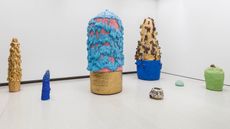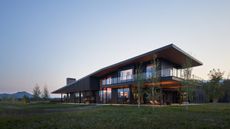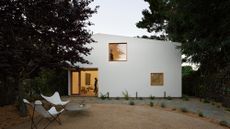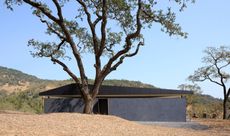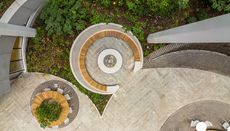Marina Otero wins Wheelwright Prize 2022
Marina Otero is announced the Wheelwright Prize 2022 winner, with a project on data storage that explores ‘Architecture to Host the Metaverse’
- (opens in new tab)
- (opens in new tab)
- (opens in new tab)
- Sign up to our newsletter Newsletter
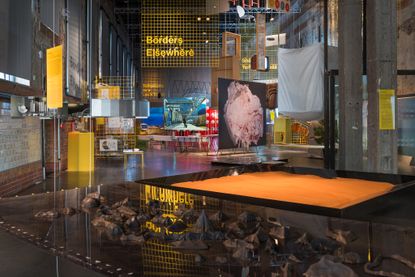
The Harvard Graduate School of Design’s Wheelwright Prize 2022 goes to Marina Otero, it has been announced today. The curator and academic scooped the prestigious win this year with her proposal ‘Future Storage: Architectures to Host the Metaverse’, focusing on storing data through the architectural and digital lens.
‘While there is an urgent need to find new ways to understand progress, imagining alternative futures in current circumstances is proving troublesome. In this context, the proposal is a deeply optimistic project that considers other worlds possible: post-anthropocentric, ecological, and plural,’ says Otero. ‘The prize reaffirms my confidence in the ability of this research to bring about new paradigms for consuming and storing data, expressly to make a difference.
‘Data centres might not seem like an exciting place for an architectural project. However, the huge scale of the operations of the data industry and its pervasiveness and increasing importance in the contemporary world – coupled with its openness to innovation and concurrent pressures to find better socio-ecological models – creates a fertile environment for experimentation and action.'

Marina Otero.
Otero currently serves as the head of the social design master’s degree at Design Academy Eindhoven in the Netherlands. She will, however, embark on her Wheelwright-focused research this summer, which will encompass both study and visits to various sites across the world – including Iceland, Chile and Sweden.
Data storage is in unprecedented demand today and Otero’s work aims to shed light on architecture's response to the subject matter, reimagining digital infrastructures. As with previous Wheelwright winners – architect Germane Barnes received the 2021 prize – the $100,000 prize will fund two years of Otero’s research and travel towards her goal.
Otero was praised by the Wheelwright Prize 2022 awarding body for her innovative and important proposal, who added that the output ‘will result in the first manual for global data centre architecture design, as well as open-source course material and public programming’.

'After Belonging: In Residence,' featured at Oslo Architecture Triennale 2016 (After Belonging: A Triennale In Residence, On Residence and the Ways We Stay in Transit).

‘I See That I See What You Don't See’, Dutch contribution to La XXII Triennale di Milano, 2019, curated by Angela Rui, Marina Otero and Francien van Westrenen.
INFORMATION
wheelwrightprize.org (opens in new tab)
Ellie Stathaki is the Architecture Editor at Wallpaper*. She trained as an architect at the Aristotle University of Thessaloniki in Greece and studied architectural history at the Bartlett in London. Now an established journalist, she has been a member of the Wallpaper* team since 2006, visiting buildings across the globe and interviewing leading architects such as Tadao Ando and Rem Koolhaas. Ellie has also taken part in judging panels, moderated events, curated shows and contributed in books, such as The Contemporary House (Thames & Hudson, 2018) and Glenn Sestig Architecture Diary (2020).
-
 Watch Ryuichi Sakamoto's mesmerising musical experience at the Brooklyn Museum
Watch Ryuichi Sakamoto's mesmerising musical experience at the Brooklyn MuseumAn iconic composer who traverses popular and high culture, Ryuichi Sakamoto pushes music into new frontiers, most recently in ‘Seeing Sound, Hearing Krug’, a new composition that pairs sound, flavour, light and texture
By David Graver • Published
-
 Last chance to see: ‘Strange Clay’ at The Hayward Gallery, London
Last chance to see: ‘Strange Clay’ at The Hayward Gallery, LondonAt London’s Hayward Gallery, group show ‘Strange Clay: Ceramics in Contemporary Art’ sees ceramic artists explore the physical, psychological, political and power of their medium
By Emily Steer • Published
-
 Aehra is Italy’s first all-electric luxury car brand. We preview its forthcoming SUV
Aehra is Italy’s first all-electric luxury car brand. We preview its forthcoming SUVAehra’s proposed electric SUV is brimming with cutting-edge technology. The Italian company hopes to shake up the high-end EV market in 2025
By Jonathan Bell • Published
-
 Spectacular Wyoming ranch sits within a restored working landscape
Spectacular Wyoming ranch sits within a restored working landscapeThis Wyoming ranch by CLB Architects offers a new approach to the Western architectural tradition, combining daring and functional modern design with a welcoming character
By Jonathan Bell • Published
-
 Columbia County house combines prefabricated methods with meticulous planning
Columbia County house combines prefabricated methods with meticulous planningThe House of Courtyards, a new Columbia County house, is a refined living space in the heart of a secluded wooded plot
By Jonathan Bell • Published
-
 Cheng+Snyder transforms suburban Californian backlot into flexible home
Cheng+Snyder transforms suburban Californian backlot into flexible homeThe Roommate House by Cheng+Snyder in Oakland exemplifies fresh approaches to planning for ever-changing demographics
By Jonathan Bell • Published
-
 Stage architecture, from Disney to dance
Stage architecture, from Disney to danceClever stage architecture makes or breaks a cultural experience – from Yellow Studio’s set for Disney’s new live-action Beauty and the Beast, to more immersive structures in the genre
By Martha Elliott • Published
-
 This bijou Sonoma County house is in sync with the landscape
This bijou Sonoma County house is in sync with the landscapeAn open and contextual Sonoma County house, Leit House is designed by San Francisco’s Schwartz and Architecture
By Ellie Stathaki • Published
-
 This snowy Rockies retreat is the perfect Colorado family stay
This snowy Rockies retreat is the perfect Colorado family stayDNA Alpine by CCY Architects is a family Colorado Rockies retreat, designed to provide the perfect mountain sports and snowy getaway experience
By Ellie Stathaki • Last updated
-
 Lose yourself in 550 Madison and Snøhetta’s public garden
Lose yourself in 550 Madison and Snøhetta’s public gardenSnøhetta designs a new public garden for 550 Madison in New York
By Pei-Ru Keh • Published
-
 11 Hoyt by Studio Gang sets a new standard for Downtown Brooklyn
11 Hoyt by Studio Gang sets a new standard for Downtown Brooklyn11 Hoyt by Studio Gang has been completed, bringing a fresh residential offering to its Brooklyn neighbourhood
By Pei-Ru Keh • Last updated

